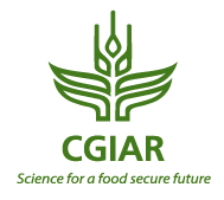CGIAR Wrap Up Workshop Ends With Plans To Scale Innovations
By Ene Okwanihe, Abuja
The West and Central African Food Systems Transformation’s (CGIAR) Regional Integrated Initiative Transforming Agrifood (TAFS-WCA) programme Annual/wrap up workshop has ended with charge to stakeholders to scale up innovations, build climate resilience and foster youth engagement and job creations in the next phase.
The CGIAR Continental Director for Africa who was represented by the Advisor Regional and Continental Engagement of the International Institute for Tropical Agriculture Dr. Kehinde Makinde gave the charge during the stakeholder’s roundtable at the event in Abuja, Nigeria’s capital.
Dr. Makinde said the new portfolio presents an opportunity to leverage on emerging technologies and deepen engagement with, local stakeholders.
“It is time to take the successful models and technologies developed under TAFS-WCA to a larger scale. This includes expanding digital platforms that connect farmers to markets, scaling climate-smart practices and continuing our work on early warning systems for pest and climate risks.
“Climate change remains a pressing challenge. We must continue to integrate climate adaptation into our research and programming, ensuring that our agricultural Systems can withstand extreme weather events and prolonged droughts. Our work with drought-tolerant crops and water-efficient practices will be central to this effort”
According to him, the agricultural sector has tremendous potential for job creation, especially for young people noting that the initiative can support youth-led agri-businesses, foster entrepreneurship, and ensure that the next generation has a stake in the future of African agriculture.
While acknowledging the importance of partnership, he said with its rich natural resources, entrepreneurial spirit, and vibrant communities, West and Central Africa can be the global leader in sustainable agriculture.
He urged participants to ensure that the initiatives create lasting change, and that the researches translates into real-World benefits for farmers and their families.
The representative of CGIAR Regional Director, who was represented by the Regional Representative of AfricaRice Dr. Francis Nwilene said agri-food systems are being threatened by emergencies such as flood and drought.
He noted that governments need to create enabling environments as there can’t be agricultural transformation without favourable government policies.
“Flood, drought, weather seasonal variabilities are also unfolding emergencies that threaten agri-food system. There cannot be any agricultural transformation without favorable government policies. The government needs to create the enabling environment for private sector to take the lead role in transforming agri-food systems”.
Dr. Nwilene said participating countries should begin to focus on downstream agri-food systems like focusing more on processing and services than primary agriculture.
The TAFS-WCA is a regional integrated initiative which aims to improve nutrition, incomes, and food security within the context of climate change in West and Central Africa through nutritious, climate-adapted, and market-driven food systems.
The three years Initiative is divided into five integrated work packages Sustainable Intensification and Diversification for Nutritious and safe food and Resilient Food Production, Informed Digital Agriculture for Climate Resilience, Sustainable and Inclusive Landscape Management, Youth and Women Entrepreneurship Models, and Accelerating Impact of Investments and Catalyzing Impact at Scale.
Oyenike Oyeniyi


Comments are closed.